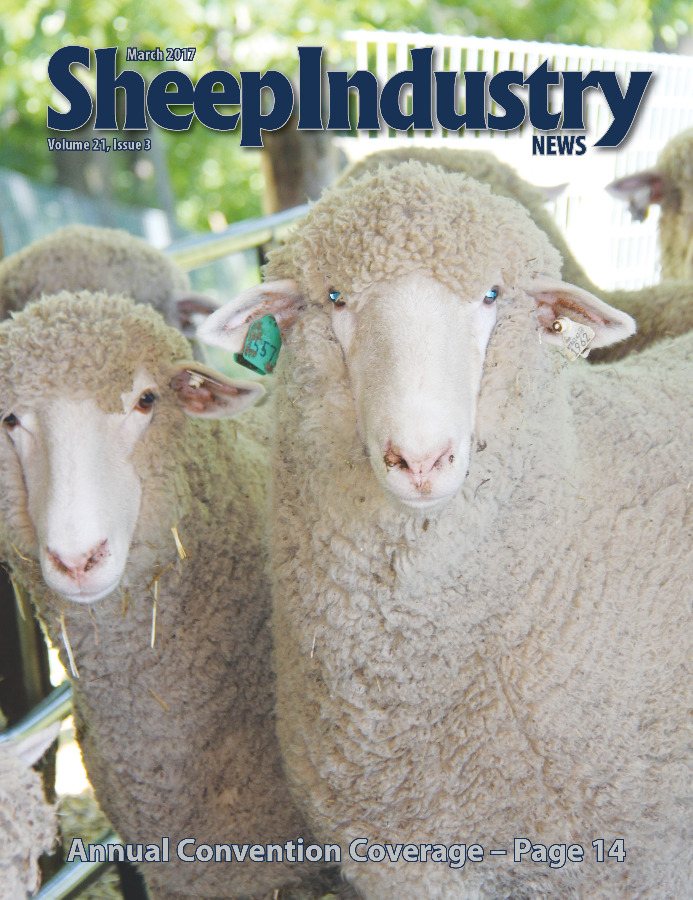
- March 2017
- President’s Notes
- Montana Sheep Conflicts Examined
- ASI Headed to Washington this Month
- Hahn Tops Shearing Field
- Convention: American Wool…Branded for the Future
- Convention: Branding American Wool
- Convention: Officers, Executive Board Elected
- Convention: Industry Veterans Honored
- Convention: Abiding by VFD Regulations
- Convention: States Share Highlights, Challenges
- Convention: Social Media Takes Center Stage
- Convention: FMD Focus of Animal Health
- Convention: WS Aerial Program a Priority
- Convention: Preparing for the New Farm Bill
- Convention: PERC Hears from Researchers
- Convention: EBVs Pay Off for Producers
- Convention: Lamb News is Encouraging
- Convention: The Fleece Awakens at MIWW
- Webinars Prove Informative
- Round 5 of Let’s Grow Grants Open
- Market Report
- The Last Word
FMD Focus of Animal Health
CAT URBIGKIT
Special to the Sheep Industry News
Foot-and-Mouth Disease is the most contagious animal disease in the world, Dr. Cindy Wolf told those gathered in Denver for a meeting of ASI’s Animal Health Committee.
The FMD virus causes illness in a variety of species with divided hooves (including swine, sheep, goats, cattle and bison) and although it is not a public health or food safety concern, it is the major disease preventing the world trade of animals and animal products. Recent outbreaks were detected in the United Kingdom in 2001, in South Korea and Japan in 2010 and in Egypt in 2012. FMD is found in Africa, some countries in South America and many countries in Asia and the Middle East. It is endemic in 96 countries.
Wolf fears that within her lifetime, FMD will come to the United States, “and will shut down our export trade.”
Wolf outlined the tools for control of FMD:
• Stop movement of animals
• Biosecurity measures
• Stamping out – through slaughter of all clinically affected and in-contact susceptible animals within 24 hours or as soon as possible
• Trace-back and Trace-forward (28 days prior to outbreak)
• Rapid diagnostics
• Vaccination
“We don’t have a vaccine ready to pull out of the refrigerator,” Wolf explained, so FMD detection “would mean instant quarantine for the affected region.”
The North American FMD Vaccine Bank holds a strategic reserve of vaccine antigens for the rapid production of vaccine in case FMD is accidentally or intentionally introduced in North America. This vaccine bank is shared by the U.S., Canada and Mexico.
Vaccine manufacturers could make 2.5 million vaccine doses in 21 days from the antigen held in reserve, Wolf said, but added that just in Iowa alone, there are 3.9 million cattle and 20.8 million hogs. Additional vaccine production created from a master seed can take as long as 14 weeks.
The USDA Animal and Plant Health Inspection Service – the agency that administers the FMD vaccine bank – would like to have a bank of a minimum of 25 million doses available for each of the 10 high-risk FMD strains. The projected cost for this level of FMD readiness is high, and is proposed to be included in the next Farm Bill. Sheep, cattle and hog producers are anticipated to support the funding request.
When it was pointed out that vaccines also have a shelf life, and disposal of outdated vaccines is expensive, Wolf replied, “The impact of FMD would be even higher.”
Also at the session, Diane Sutton, DVM of USDA/APHIS/VS reported on the excellent progress made on the elimination of scrapie in sheep in the United States, adding that similar effort needs to be made to eliminate the disease in goats.
There are two remaining scrapie cases that are currently being dealt with: one in a long-term infected goat herd in Colorado; and a Texas sheep case that is resolved but is waiting for cleaning and disinfection for completion.
Sutton emphasized that producers need to help to find the last scrapie cases in the country. In order to find the remaining scrapie infected sheep and goats, APHIS needs more sample submissions from mature sheep and goats that die on farm. The only diagnostic tests currently available to determine if a sheep or goat has scrapie requires brain or lymphoid tissue. Producers may submit heads of mature sheep/goats for scrapie testing to the Veterinary Services facility in Remington, Ind. Procedures for whole head collection are available on the APHIS website.
Scrapie is typically diagnosed by finding abnormal prion protein accumulation in the brain and/or lymphoid tissue of infected sheep or goats.

